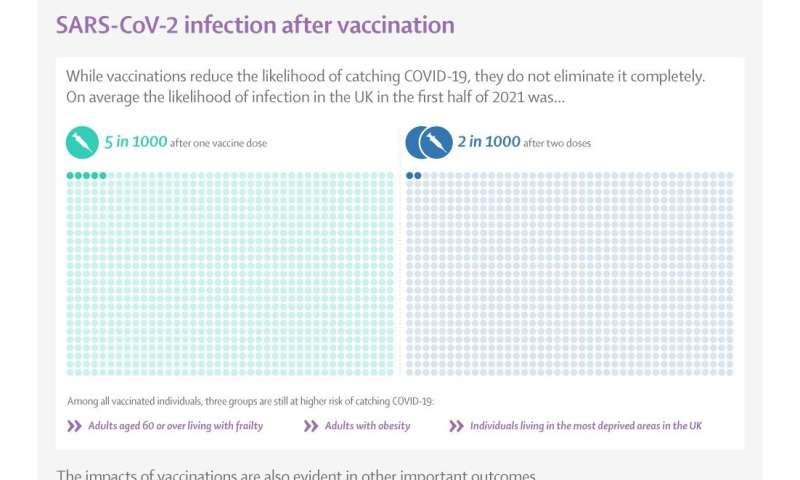Adults who have received a double vaccination are 47% less likely to have Long COVID should they contract a COVID-19 infection.
Researchers at King’s College London analyzed data from participants logging their symptoms, tests and vaccines on the UK ZOE COVID Symptom Study app between 8th December 2020 and 4 July 2021, including 1,240,009 (first dose) and 971,504 (second dose) vaccinated UK adults. The research team assessed a range of factors, including age, frailty and areas of deprivation and compared that with post-vaccination infection.
The study, published today in The Lancet Infectious Diseases, found that in the unlikely event of catching COVID-19 after being double vaccinated, the risk of Long COVID was reduced by almost half. There were also fewer hospitalisations (73% less likely) and lower burden of acute symptoms (31% less likely) among those fully vaccinated. The nature of the most common symptoms were similar to unvaccinated adults—e.g. anosmia,(loss of smell) cough, fever, headaches, and fatigue. All these symptoms were milder and less frequently reported by people who were vaccinated, and they were half as likely to get multiple symptoms in the first week of illness. Sneezing was the only symptom which was more commonly reported in vaccinated people with COVID-19.

However, people living in most deprived areas were at greater risk of infection after a single vaccination. While age on its own was not a risk factor, individuals who had health conditions that limited their independence—such as frailty—were up to two times more likely to contract COVID-19 infection after vaccination, and of getting sick.
The findings demonstrate the need to target at-risk groups. Frail adults have already been shown to be disproportionately affected by COVID-19. The research team suggests strategies such as a timely booster program, targeted infection control measures and more research into the immune response to vaccination in this group could help address the issue.
Lead researcher Dr. Claire Steves from King’s College London said: “In terms of the burden of Long COVID, it’s good news that our research has found that having a double vaccination significantly reduces the risk of both catching the virus and if you do, developing long standing symptoms. However, among our frail, older adults and those living in deprived areas the risk is still significant and they should be urgently prioritized for second and booster vaccinations.”
Professor Tim Spector from King’s College London and Lead investigator of ZOE COVID Study comments: “Vaccinations are massively reducing the chances of people getting Long COVID in two ways. Firstly, by reducing the risk of any symptoms by 8 to 10 fold and then by halving the chances of any infection turning into Long COVID, if it does happen. Whatever the duration of symptoms we are seeing that infections after two vaccinations are also much milder, so vaccines are really changing the disease and for the better. We are encouraging people to get their 2nd jab as soon as they can.”
Health and Social Care Secretary, Sajid Javid said: “COVID-19 vaccines have saved more than 105,000 lives and prevented over 24 million infections in England alone. This research is encouraging, suggesting vaccines are not only preventing deaths but could also help prevent some of the longer lasting symptoms.
“We have invested £50 million in research to better understand the lasting effects of COVID and over 80 long COVID assessment services have opened across England as part of a £100 million expansion of care for those suffering the effects.
“It is clear vaccines are building a wall of defense against the virus and are the best way to protect people from serious illness. I encourage everyone who is eligible to come forward for both their jabs as quickly as possible.”
King’s College London


